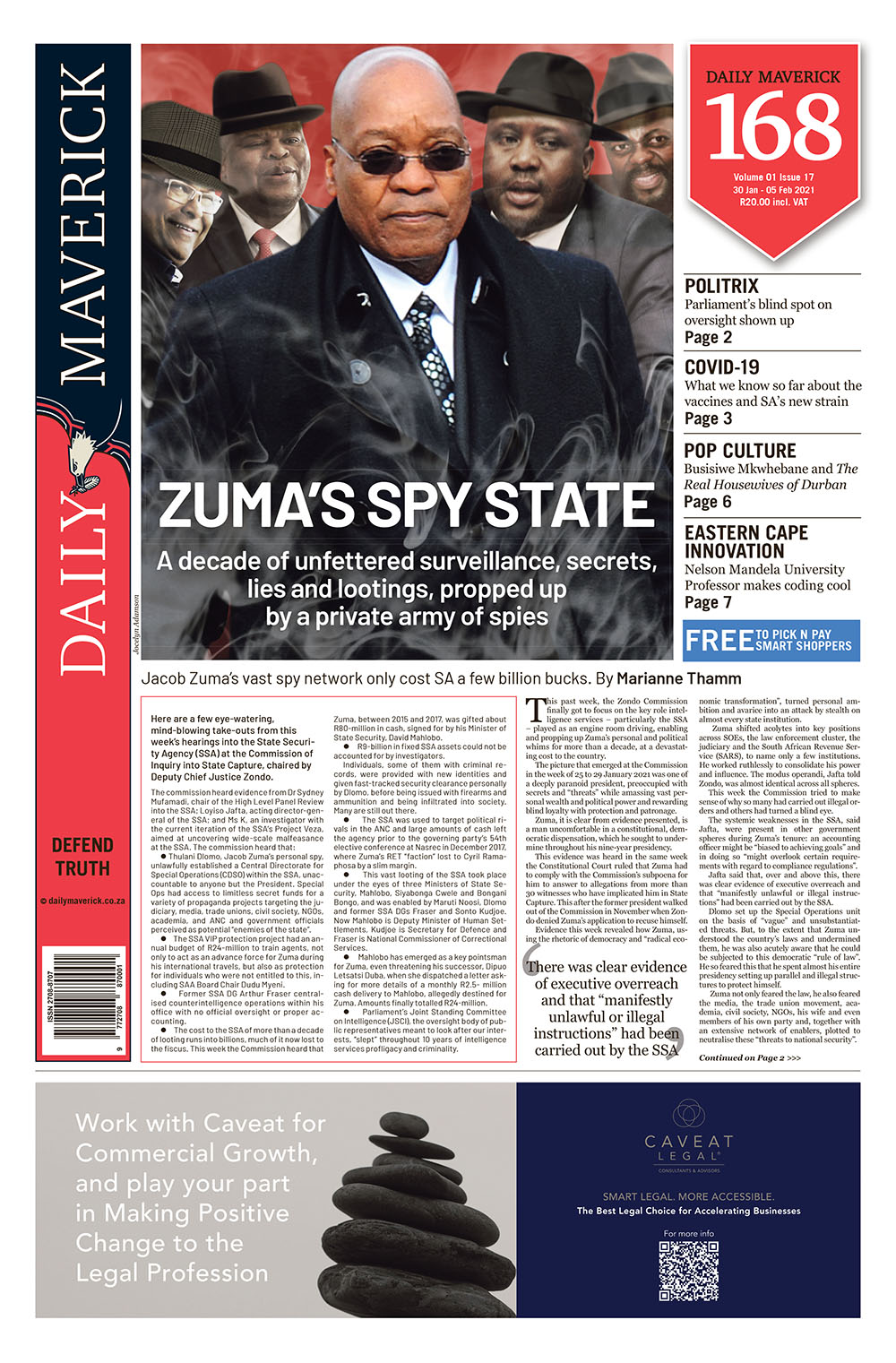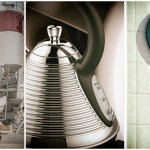First published in the Daily Maverick 168 weekly newspaper.
Here are a few eye-watering, mind-blowing take-outs from this week’s hearings into the State Security Agency (SSA) at the Commission of Inquiry into State Capture, chaired by Deputy Chief Justice Zondo.
The commission heard evidence from Dr Sydney Mufamadi, chair of the High Level Panel Review into the SSA; Loyiso Jafta, acting director-general of the SSA; and Ms K, an investigator with the current iteration of the SSA’s Project Veza, aimed at uncovering wide-scale malfeasance at the SSA. The commission heard that:
- Thulani Dlomo, Jacob Zuma’s personal spy, unlawfully established a Central Directorate for Special Operations (CDSO) within the SSA, unaccountable to anyone but the President. Special Ops had access to limitless secret funds for a variety of propaganda projects targeting the judiciary, media, trade unions, civil society, NGOs, academia, and ANC and government officials perceived as potential “enemies of the state”.
- The SSA VIP protection project had an annual budget of R24-million to train agents, not only to act as an advance force for Zuma during his international travels, but also as protection for individuals who were not entitled to this, including SAA Board Chair Dudu Myeni.
- Former SSA DG Arthur Fraser centralised counterintelligence operations within his office with no official oversight or proper accounting.
- The cost to the SSA of more than a decade of looting runs into billions, much of it now lost to the fiscus. This week the Commission heard that Zuma, between 2015 and 2017, was gifted about R80-million in cash, signed for by his Minister of State Security, David Mahlobo.
- R9-billion in fixed SSA assets could not be accounted for by investigators.
- Individuals, some of them with criminal records, were provided with new identities and given fast-tracked security clearance personally by Dlomo, before being issued with firearms and ammunition and being infiltrated into society. Many are still out there.
- The SSA was used to target political rivals in the ANC and large amounts of cash left the agency prior to the governing party’s 54th elective conference at Nasrec in December 2017, where Zuma’s RET “faction” lost to Cyril Ramaphosa by a slim margin.
- This vast looting of the SSA took place under the eyes of three Ministers of State Security, Mahlobo, Siyabonga Cwele and Bongani Bongo, and was enabled by Maruti Noosi, Dlomo and former SSA DGs Fraser and Sonto Kudjoe. Now Mahlobo is Deputy Minister of Human Settlements, Kudjoe is Secretary for Defence and Fraser is National Commissioner of Correctional Services.
- Mahlobo has emerged as a key pointsman for Zuma, even threatening his successor, Dipuo Letsatsi Duba, when she dispatched a letter asking for more details of a monthly R2.5- million cash delivery to Mahlobo, allegedly destined for Zuma. Amounts finally totalled R24-million.
- Parliament’s Joint Standing Committee on Intelligence (JSCI), the oversight body of public representatives meant to look after our interests, “slept” throughout 10 years of intelligence services profligacy and criminality.
This past week, the Zondo Commission finally got to focus on the key role intelligence services – particularly the SSA – played as an engine room driving, enabling and propping up Zuma’s personal and political whims for more than a decade, at a devastating cost to the country.
The picture that emerged at the Commission in the week of 25 to 29 January 2021 was one of a deeply paranoid president, preoccupied with secrets and “threats” while amassing vast personal wealth and political power and rewarding blind loyalty with protection and patronage.
Zuma, it is clear from evidence presented, is a man uncomfortable in a constitutional, democratic dispensation, which he sought to undermine throughout his nine-year presidency.
This evidence was heard in the same week the Constitutional Court ruled that Zuma had to comply with the Commission’s subpoena for him to answer to allegations from more than 30 witnesses who have implicated him in State Capture. This after the former president walked out of the Commission in November when Zondo denied Zuma’s application to recuse himself.
Evidence this week revealed how Zuma, using the rhetoric of democracy and “radical economic transformation”, turned personal ambition and avarice into an attack by stealth on almost every state institution.
Zuma shifted acolytes into key positions across SOEs, the law enforcement cluster, the judiciary and the South African Revenue Service (SARS), to name only a few institutions. He worked ruthlessly to consolidate his power and influence. The modus operandi, Jafta told Zondo, was almost identical across all spheres.
This week the Commission tried to make sense of why so many had carried out illegal orders and others had turned a blind eye.
The systemic weaknesses in the SSA, said Jafta, were present in other government spheres during Zuma’s tenure: an accounting officer might be “biased to achieving goals” and in doing so “might overlook certain requirements with regard to compliance regulations”.
Jafta said that, over and above this, there was clear evidence of executive overreach and that “manifestly unlawful or illegal instructions” had been carried out by the SSA.
Dlomo set up the Special Operations unit on the basis of “vague” and unsubstantiated threats. But, to the extent that Zuma understood the country’s laws and undermined them, he was also acutely aware that he could be subjected to this democratic “rule of law”. He so feared this that he spent almost his entire presidency setting up parallel and illegal structures to protect himself.
Zuma not only feared the law, he also feared the media, the trade union movement, academia, civil society, NGOs, his wife and even members of his own party and, together with an extensive network of enablers, plotted to neutralise these “threats to national security”.
The only comfort South Africans can take from Zuma’s lost decade is that it gives life to Thomas Jefferson’s words: “When the people fear the government, there is tyranny. When the government fears the people, there is liberty.”
On Monday the Commission heard from SSA review chair Mufamadi of Project Wave and how the agency paid Iqbal Surve’s African News Agency (ANA) R20-million in 2015/16 to train SSA agents and place them across various “international” platforms. The agents were tasked with countering any negative news about the president or his government.
Jafta on Tuesday told the Commission how the SSA had set up a bogus union, the Workers Association Union (WAU), in Rustenberg’s volatile platinum belt to rival and spy on the Association of Mineworkers and Construction Union (AMCU).
The establishment of WAU in 2014 mirrors the launch in 1986, in the dying days of apartheid, of Uwusa by Inkatha; it was funded entirely by the Security Branch. This, the Truth and Reconciliation Imraan Commission was told, resulted in 207 instances of violence as Uwusa vied with the ANC-aligned Cosatu. In 2016, Zuma, Mahlobo and others agreed to an out-of-court settlement with WAU founder Thebe Maswabi, who asserted in court papers that he had personally met Zuma. Jafta told the Zondo Commission that the settlement had regrettably served to shroud the entire scandal in secrecy.
The post-1994 intelligence milieu in South Africa was meant to be a more “human-centric” one aimed at protecting the national interests of a democratic state, moving away from the criminal abuse of intelligence to quell civic and political dissidence.
This “doctrinal” shift was contained in the government’s 1994 White Paper on Security and the National Strategic Intelligence Act.
The introduction of the National Intelligence Co-ordinating Committee (Nicoc), a statutory intelligence co-ordinating structure, was meant to curb internal threats to national security and to mitigate meddling by political masters, the Commission heard.
By 2009, when Zuma took his oath of office, some of the sods in preparation for the abuse of the country’s new intelligence services had already been turned by his mildly paranoid predecessor, Thabo Mbeki, who, in 2003, expanded the mandate of the then National Intelligence Agency to include “political and economic” intelligence.
On Mbeki’s watch, the intelligence services also supersized themselves, with personnel gobbling up 74% of the domestic intelligence budget.
In 2006, the Ministerial Review Commission on Intelligence (known as the Matthews Commission), was set up. In 2008 it made damning findings on the state of the country’s intelligence agencies, which it found had become “a threat to democracy”.
The tentacles of Zuma’s shadow state, the Commission heard, reached all levels of society. It targeted the Fees Must Fall movement (with Project Academia), as well as civil society organisations such as Right2Know, the #Zumamustfall “movement” and the Council for the Advancement of the SA Constitution (Casac).
At that stage, the intelligence service had been decentralised into domestic and foreign sections, but in 2009, soon after he took power, Zuma issued a proclamation bypassing the legislature and amalgamating five of the country’s intelligence services into the all-powerful SSA. The commission heard that Zuma’s proclamation was unconstitutional in the first place.
Mufamadi began his testimony on Monday by saying that the start of a return to an “apartheid-era warrior state” mentality had started with Zuma’s proclamation. During Zuma’s term, the SSA could well have adopted the motto of the feared East German secret police, the Stasi, and its Soviet-era thinking: “Sword and Shield for the Party” (or, more precisely, “Sword and Shield for My Faction of the Party”).
Authoritarian and anti-democratic leaders need the protection of personal and secret security services, like Zaire’s kleptocrat Mobuto Sese Seko’s National Police Intelligence Service and Robert Mugabe’s feared Central Intelligence Organisation, to exercise power over citizens, the economy and political rivals. In South Africa, elements of the former apartheid security state remained in place after 1994 and consolidated their power in the post-apartheid era. Some of these spooks later served Zuma loyally.
The depth of Zuma’s capacity for cruelty and for involving the state in personal matters was laid bare for the Commission in the account of the treatment of one of his wives, Nompumelelo Ntuli.
It past Mahlobo who first brought news to Zuma that his wife had poisoned him in 2014, and it was Mahlobo who collected R5.2-million from the SSA to hold the First Lady in a “safe house”. This was part of a project named Tin Roof, initiated by Mahlobo. The Commission heard Ntuli had been kept against her will, which Zondo remarked was “a very serious matter”.
As a result of the alleged poisoning of Zuma – discovered on a trip to the US and later treated in Russia – the SSA and Mahlobo siphoned off funds to set up a fully kitted toxicology unit in a house in Pretoria. There, two toxicologists and two assistants worked at first for R500,00o a month, ballooning later to a monthly R1.8-million.
The team was tasked with checking Zuma’s food and his bedsheets, but only ever found a few bottles of expired cool drink in the Nkandla pantry to threaten the president’s life.
The Commission heard that the toxicologist programme had been facilitated by SSA operative Mandisa Mokwena, who used a company she had registered to transfer the “large amounts of cash” needed for the project. Mokwena later headed SARS’s risk management division and was appointed in 2019 to head the Passenger Rail Agency of SA’s security division, where she now leads a R5-billion investment programme.
Zondo heard that another of the the SSA’s operations, Project Justice, might have been a “ruse to access state resources”, but Mufamadi said its stated aim at the time had been to “recruit and handle” sources in the judiciary “in order to influence the outcome of cases against President Zuma”.
The tentacles of Zuma’s shadow state, the Commission heard, reached all levels of society. It targeted the Fees Must Fall movement (with Project Academia), as well as civil society organisations such as Right2Know, the #Zumamustfall “movement” and the Council for the Advancement of the SA Constitution (Casac).
The preoccupation of SA’s intelligence services, including the police’s Crime Intelligence Division, with the factional battles in the ANC, has left South Africa vulnerable to all manner of threats, not least of which are international criminal syndicates – including the Gupta family – who have taken South Africa to the brink. DM168
This story first appeared in our weekly Daily Maverick 168 newspaper which is available for free to Pick n Pay Smart Shoppers at these Pick n Pay stores.



















 Become an Insider
Become an Insider
Surely for “those in the know” this is old news ,so why has zero been done ,until now? This is treasonable, unconstitutional behavior. One “sick note” will negate all those irritating pleas to come clean. I predict a bonanza for the medical specialists in Moscow and Dubai. Plus a long-stay (very Shabir sick) patient. Does Baba play golf?
Chess. But if the sick note references 2021 ICD-10-CM Diagnosis Code G30.1 …
Yup, either that or Diagnosis Code R41.2 🙂
Thomas Jefferson’s words: “When the people fear the government, there is tyranny. When the government fears the people, there is liberty.” When will South Africans step up to this?
The accused have their backs to the wall. Zuma wants to escape to Russia. The break up of the full Zondo team surely is the biggest risk to the Country. President Ramaphosa please protect them. Do a full risk analysis of how the rogue SSA will operate from now to stop everything from coming into the open.
Presumably Ramaphosa and the then Top 6 knew all about this and did nothing as usual. Except protect the criminals in the ANC as the ANC does to this day. Zuma was even in attendance at the most recent legotla presided over by Ramaphosa.
Classic picture of criminal network. The Black mafia of South Africa, with just the AK47 rifles missing
QUOTE EX ABOVE ARTICLE: This week the Commission heard that Zuma, between 2015 and 2017, was gifted about R80-million in cash, signed for by his Minister of State Security, David Mahlobo.
Is this real?
The cash source could only have been the spoils of many cash heists, drug or cigarette sales.
The other (unlikely) option would be via certain bank client accounts that would have had to acquire sufficient funds into their accounts, in order to facilitate these withdrawals – and obviously pre-cleared and scheduled – in order to ensure that very large amounts of bank notes are readily on hand and available for withdrawal.
But then, until now, no sirens, red lights or bank reporting infrastructure managed to trigger an alarm or stop or report such repetitive deposits and withdrawals.
Which of our banks could have allowed the systematic withdrawal of such funds IN CASH?
Surely this would have required collusion at a VERY HIGH LEVEL with a bank or branch, or multiple banks or branches. VBS?
Have any of the banks been audited by a Serious Crimes Unit in order to establish bank involvement?
Is SARS aware of these irregular cash movements?
Was the receipt of these funds deposited into another local bank account?
Left in a suitcase?
The most logical and safest journey was probably via diplomatic immunity to a friendly foreign location such as Dubai, that could accept such deposits into existing bank accounts without asking questions or requiring that the source be disclosed.
The mind boggles.
Dennis de Necker
How can thee rank and file of the ANC continue to support this clearly criminal organisation? One would think that any law abiding person would cut all ties with it? Where are the upright and good folk in the ANC?
No massive resignations, just a hope that it will all go away?